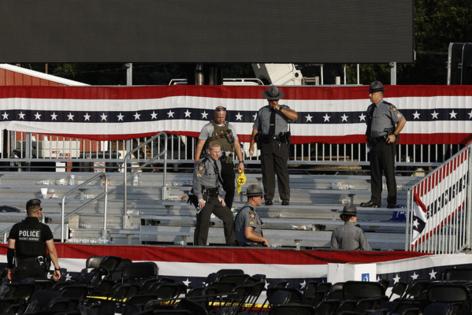Shootings of Minnesota lawmakers come amid national rise in political violence
Published in News & Features
MINNEAPOLIS — The shootings of two state lawmakers by a suspect with a “manifesto” of other political targets was an unprecedented act in Minnesota history. But it also comes at a divisive, volatile moment in U.S. politics.
The assassination of Rep. Melissa Hortman and wounding of Sen. John Hoffman, both Democrats, follow other high-profile incidents of political violence across the country in recent years, both aimed at high-profile figures and community members. Violent rhetoric has ratcheted up and public officials say they have to hire more security because of the volume of threats.
Members of both political parties have been targets of violence, including the assassination attempts of President Donald Trump last year and the plot to kidnap Democratic Michigan Gov. Gretchen Whitmer in 2020.
In 2017, then-Republican House Majority Leader Steve Scalise was shot during a congressional baseball practice. Former U.S. Rep. Gabrielle Giffords survived an assassination attempt in 2011.
Reuters has been tracking incidents of political violence since Trump supporters stormed the U.S. Capitol on Jan. 6, 2021, and, as of last fall, had identified more than 300 cases — calling it the most sustained increase in political violence the country has seen since the 1970s.
A rise of targeted violence toward elected officials, public employees and the judiciary are among the signs of the time for the country, said Brian Levin, a professor emeritus and founding director of the Center for the Study for Hate and Extremism at California State University.
“We have seen increases virtually across the board, relating to public officials over the last half decade,” Levin said. “Moreover, within the realm of political violence, what we are seeing is these acts are often accompanied by political statements justifying the violence, which appears to be the case here.”
In everyday discourse, including online forums, there is an increasing acceptability of “eliminationist language,” Levin said, which is exacerbated by an online universe where “aggression produces clicks and engagement.”
This comes during a decline of community trust in institutions and the people who symbolize them, including state legislatures.
“This is part of a chain and part of this relates to how these extremists operate,” Levin said. “They may think globally, but oftentimes they act fairly locally.”
Along with elected officials, citizens, campaign staffers and election workers have been affected by political violence in recent years. A number of incidents occurred amid heightened political tensions in the lead-up to last year’s election and aftermath of Trump taking office.
In Minnesota, a man was charged with a felony for threats of violence after he said he would shoot people at a Rochester polling place last year.
In Arizona, a man was arrested after three shootings at a Democratic Party campaign office in the Phoenix area, which hit the office’s front door and window but did not injure anyone.
And this spring, an Albuquerque man firebombed the Republican Party of New Mexico’s headquarters and a Tesla showroom.
A 2023 poll of nearly 300 former Congress members found almost half reported they or their family members received threats when they were in office. The poll, conducted by the University of Massachusetts with the U.S. Association of Former Members of Congress, found that was substantially higher among people of color and women, of whom about 70% got such threats.
State Sen. Aric Putnam, DFL-St. Cloud, said he’s witnessed a troubling trend toward violence and extreme rhetoric in political speech.
“We have a permission structure where you can say things that are horribly violent and then take them back,” said Putnam, a communications professor at St. John’s University in Collegeville. Pundits and politicians, he added with disbelief, then act surprised when “horrible things happen.”
“There’s another victim of today’s senseless shootings: Democracy itself,” Minnesota Secretary of State Steve Simon, a Democrat, said a statement. “Political violence is unacceptable. To perpetrate it, encourage it, or pretend to ignore it will only poison our democracy. We cannot go on like this as a state or nation.”
Simon urged people to resolve political differences peacefully, through the ballot box.
———
(Christopher Vondracek of the Minnesota Star Tribune contributed to this story.)
———
©2025 The Minnesota Star Tribune. Visit startribune.com. Distributed by Tribune Content Agency, LLC







Comments